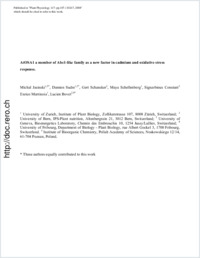AtOSA1 a member of Abc1-like family as a new factor in cadmium and oxidative stress response
- Jasinski, Michal University of Zurich, Institute of Plant Biology, Switzerland - Institute of Bioorganic Chemistry, Polish Academy of Sciences, Poznan, Poland
- Sudre, Damien University of Zurich, Institute of Plant Biology, Switzerland - University of Bern, IPS-Plant nutrition, Switzerland
- Schansker, Gert University of Geneva, Bioenergetics Laboratory, Jussy/Lullier, Switzerland
- Schellenberg, Maya University of Zurich, Institute of Plant Biology, Switzerland
- Constant, Signarbieux University of Bern, IPS-Plant nutrition, Switzerland
- Martinoia, Enrico University of Zurich, Institute of Plant Biology, Switzerland
- Bovet, Lucien University of Bern, IPS-Plant nutrition, Switzerland - University of Fribourg, Department of Biology, Switzerland
-
04.04.2008
Published in:
- Plant Physiology. - 2008, vol. 147, p. pp.107.110247
English
The analysis of gene expression in Arabidopsis thaliana using cDNA-microarrays and RT-PCR showed that AtOSA1 (Arabidopsis thaliana Oxidative Stress related Abc1 like protein) transcript levels are influenced by Cd²⁺ treatment. The comparison of protein sequences revealed that AtOSA1 belongs to the family of Abc1 proteins. Up to now, Abc1-like proteins have been identified in prokaryotes and in the mitochondria of eukaryotes. AtOSA1 is the first member of this family to be localized in the chloroplasts. However, despite sharing homology to the mitochondrial ABC1 of Saccharomyces cerevisiae, AtOSA1 was not able to complement yeast strains deleted in endogenous ABC1 gene, thereby suggesting different function between AtOSA1 and the yeast ABC1.The atosa1-1 and atosa1-2 T-DNA insertion mutants were more affected than wild type plants by Cd²⁺ and revealed an increased sensitivity towards oxidative stress (H₂O₂) and high light. The mutants exhibited higher superoxide dismutase activities and differences in the expression of genes involved in the antioxidant pathway.In addition to the conserved Abc1 region in the AtOSA1 protein sequence, putative kinase domains were found. Protein kinase assays in gelo using myelin basic protein as a kinase substrate revealed that chloroplast envelope membrane fractions from the AtOSA1 mutant lacked a 70 kD phosphorylated protein compared to the wild type. Our data suggest that the chloroplast AtOSA1 protein is a new factor playing a role in a balance of oxidative stress.
- Faculty
- Faculté des sciences et de médecine
- Department
- Département de Biologie
- Language
-
- English
- Classification
- Biological sciences
- License
- License undefined
- Identifiers
-
- RERO DOC 9200
- DOI 10.1104/pp.107.110247
- Persistent URL
- https://folia.unifr.ch/unifr/documents/300627
Statistics
Document views: 100
File downloads:
- bovet_ama.pdf: 194
